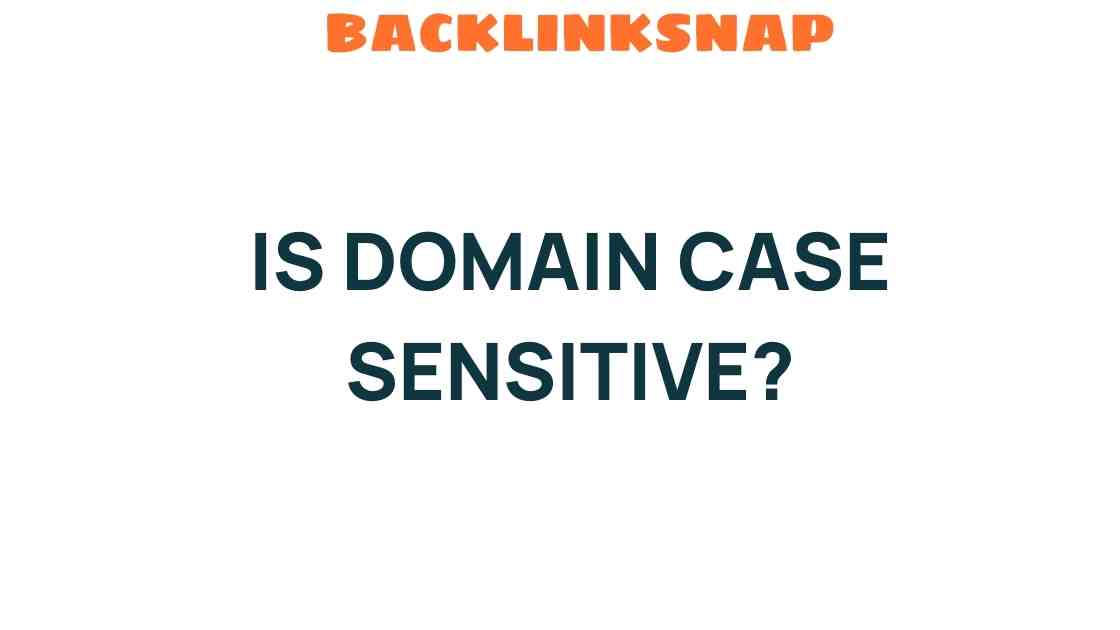Is Domain Case Sensitive? Unraveling the Myths and Facts
When delving into the world of internet domains, one question often arises: is domain case sensitive? Understanding domain case sensitivity is crucial for web developers, marketers, and anyone looking to establish a solid online presence. This article aims to clarify this concept and explore the implications it has on website navigation, SEO, and online branding.
Understanding Domain Case Sensitivity
To answer the question, we need to first clarify what we mean by domain case sensitivity. In simple terms, when we talk about the case sensitivity of a domain name, we’re referring to whether or not the characters in a domain name (like uppercase and lowercase letters) matter. The short answer is that domain names themselves are not case sensitive. This means that www.example.com, WWW.EXAMPLE.COM, and www.ExAmPlE.cOm all point to the exact same website.
However, this is not entirely the end of the story. While the domain name portion (the part before the first slash in a URL) is case insensitive, the path that follows (the part after the domain) can be case sensitive, depending on the server configuration.
From a website navigation perspective, understanding the nuances of case sensitivity is crucial. If you have a website with URLs that include path elements (like www.example.com/Page versus www.example.com/page), the server’s settings will dictate whether those two URLs lead to the same page. Many web servers, especially those running on Linux, treat these paths as case sensitive. This can lead to confusion and broken links if users or marketers are not careful.
SEO Implications of Domain Case Sensitivity
When it comes to SEO, the implications of domain case sensitivity can be significant. Search engines treat URLs as unique identifiers of web pages. If your website has multiple URLs that lead to the same content—one in uppercase and one in lowercase—search engines might see them as different pages, which can dilute your SEO efforts.
- Inconsistent URLs can lead to duplicate content issues.
- Search engines may index both versions, splitting the page authority.
- Users might bookmark or share the wrong version, leading to traffic loss.
To avoid these pitfalls, it’s advisable to standardize your URLs. Choose a format (either all lowercase or a specific casing convention) and stick to it throughout your website. This not only aids in SEO but also enhances user experience.
Domain Names and Online Branding
Your domain name is a critical part of your online branding strategy. A memorable, easy-to-type domain name can significantly impact your website traffic and user engagement. When considering domain case sensitivity, remember that users may not always remember the exact casing of your domain. For instance, a user might type in www.ExampleBrand.com when the actual domain is www.examplebrand.com.
This could potentially lead to a loss of traffic if users land on a different page or get an error message. Therefore, it’s essential to ensure that your domain name is easy to remember and type, minimizing the risk of mistakes. A good practice is to promote your domain in all lowercase, which is the most common format.
The Role of URL Structure
A well-structured URL not only enhances user experience but also improves your SEO efforts. The structure of your URLs, including the use of lowercase letters, is vital. Here are some tips to consider:
- Use hyphens instead of underscores to separate words in URLs.
- Keep URLs short and descriptive.
- Avoid using special characters or unnecessary parameters.
By adhering to these practices, you can create a cleaner and more effective URL structure that benefits both users and search engines.
Common Myths About Domain Case Sensitivity
Despite the clear facts about domain case sensitivity, several myths persist. Let’s debunk a few:
- Myth 1: All domains are case sensitive.
Fact: The domain name is not case sensitive, but the path can be. - Myth 2: Search engines penalize case-sensitive URLs.
Fact: It’s not the case sensitivity that causes penalties, but rather duplicate content issues. - Myth 3: Using uppercase letters in domain names improves SEO.
Fact: SEO is unaffected by the case of letters in the domain name.
FAQs About Domain Case Sensitivity
- 1. Are domain names case sensitive?
No, the domain name itself is not case sensitive. - 2. Is the URL path case sensitive?
Yes, the path after the domain can be case sensitive depending on the server. - 3. How does case sensitivity affect SEO?
It can lead to duplicate content issues if different cases are used for the same content. - 4. What should I do if my website has inconsistent casing in URLs?
Standardize your URLs and set up 301 redirects to avoid broken links. - 5. Does using all lowercase improve user experience?
Yes, it reduces the chances of user error when typing the URL. - 6. Can I register a domain with uppercase letters?
While you can, it’s best practice to promote it in lowercase for consistency.
Conclusion
In conclusion, understanding domain case sensitivity is essential for anyone involved in managing a website. While the domain name itself is not case sensitive, the path can be, leading to potential problems in website navigation and SEO. By standardizing your URLs, promoting your domain in lowercase, and being aware of the implications for online branding, you can create a more effective and user-friendly web presence. As you embark on your online journey, keep these insights in mind to navigate the complexities of internet domains successfully.
For more information on effective domain management, visit this resource. Happy web building!
This article is in the category SEO Optimization and created by BacklinkSnap Team




